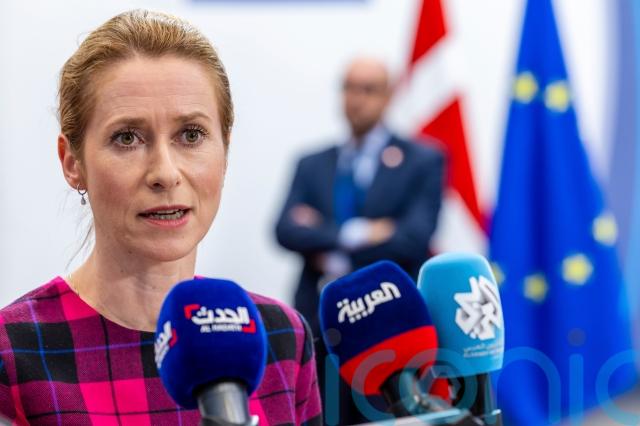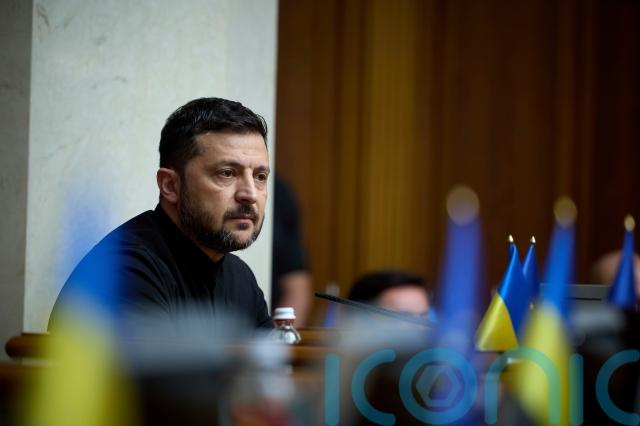
The European Union approved a new raft of sanctions against Russia over its war on Ukraine, including a lower oil price cap, a ban on transactions with Nord Stream gas pipelines and the targeting of more shadow fleet ships, the EU foreign policy chief said.
Kaja Kallas said in a statement: “The message is clear: Europe will not back down in its support for Ukraine. The EU will keep raising the pressure until Russia ends its war.”
Ms Kallas said the measures amount to “one of its strongest sanctions packages against Russia to date”, linked to the war, now in its fourth year.

It comes as European countries start to buy US weapons for Ukraine to help the country better defend itself.
Ukrainian President Volodymyr Zelensky welcomed the new measures, describing them as a “timely and necessary” step amid intensified Russian attacks.
“All infrastructure of Russia’s war must be blocked,” Mr Zelensky said, adding that Ukraine will synchronise its sanctions with the EU and introduce its own additional measures soon.
The European Commission, the EU’s executive branch, had proposed to lower the oil price cap from 60 US dollars (£44) to 45 dollars (£33), which is lower than the market price, to target Russia’s vast energy revenues.
The 27 member countries decided to set the price per barrel at just under 48 dollars (£35).
The EU had hoped to get major international powers in the Group of Seven countries involved in the price cap to broaden the impact, but conflict in the Middle East pushed up oil prices and the Trump administration could not be brought on board.
In 2023, Ukraine’s Western allies limited sales of Russian oil to 60 dollars per barrel, but the price cap was largely symbolic as most of Moscow’s crude — its main money maker — cost less than that.
Still, the cap was there in case oil prices rose.
Oil income is the linchpin of Russia’s economy, allowing President Vladimir Putin to pour money into the armed forces without worsening inflation for everyday people and avoiding a currency collapse.

A new import ban was also imposed in an attempt to close a loophole allowing Russia to export crude oil via a number of non-EU countries indirectly.
The EU also targeted the Nord Stream pipelines between Russia and Germany to prevent Mr Putin from generating any revenue from them in future, notably by discouraging would-be investors.
Russian energy giant Rosneft’s refinery in India was hit as well.
The pipelines were built to carry Russian natural gas to Germany but are not in operation. They were targeted by sabotage in 2022, but the source of the underwater explosions has remained a major international mystery.
On top of that, the new EU sanctions targeted Russia’s banking sector, with the aim of limiting the Kremlin’s ability to raise funds or carry out financial transactions. Two Chinese banks were added to the list.
The EU has slapped several rounds of sanctions on Russia since Mr Putin ordered his troops into Ukraine on February 24 2022.
More than 2,400 officials and “entities” — often government agencies, banks, companies or organisations — have been hit with asset freezes and travel bans.
But each round of sanctions is getting harder to agree on, as measures targeting Russia bite the economies of the 27 member nations.
Slovakia held up the latest package over concerns about proposals to stop Russian gas supplies, which it relies on.
The last raft of EU sanctions, imposed on May 20, targeted almost 200 ships in Russia’s sanction-busting shadow fleet of tankers.
On Friday, 105 more ships were blocked from European ports, locks and from ship-to-ship transfers, bringing the total number of vessels now sanctioned to more than 400.
Subscribe or register today to discover more from DonegalLive.ie
Buy the e-paper of the Donegal Democrat, Donegal People's Press, Donegal Post and Inish Times here for instant access to Donegal's premier news titles.
Keep up with the latest news from Donegal with our daily newsletter featuring the most important stories of the day delivered to your inbox every evening at 5pm.